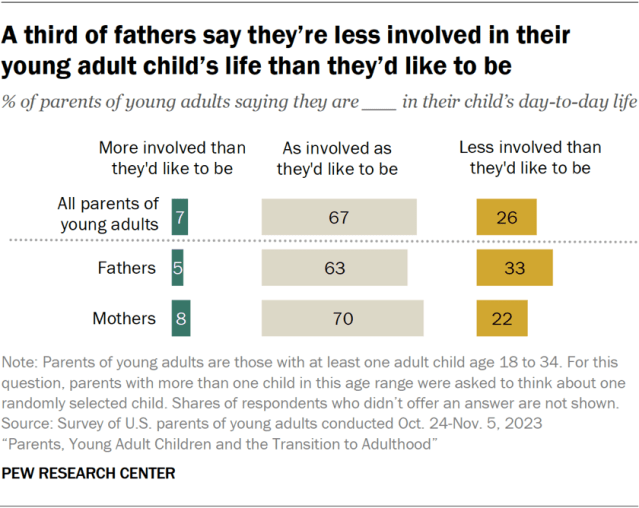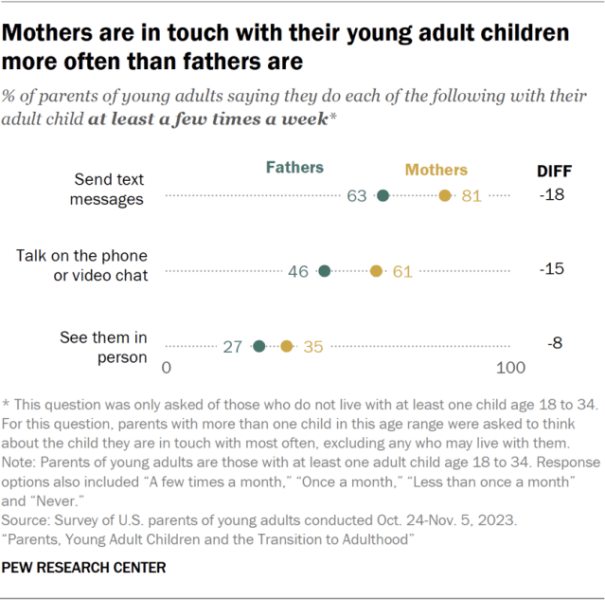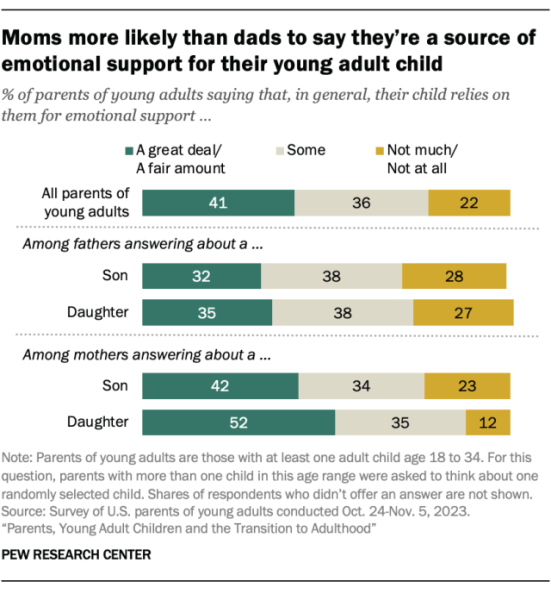A daughter paints her father’s face in camouflage colors before a Sunday hunt in South Heidelberg Township, Pennsylvania. (Ben Hasty/MediaNews Group/Reading Eagle via Getty Images)
Most dads say they feel proud when they think about their young adult children, and they draw a direct line between their parenting and their children’s successes and failures. Still, fathers are more likely than mothers to feel disconnected from their young adult children, and many fathers express a desire for more frequent communication, a fall 2023 Pew Research Center survey shows.
How we did this
Pew Research Center conducted this analysis to understand fathers’ emotional connections with their young adult children. This analysis is based on two surveys conducted from Oct. 24 to Nov. 5, 2023, as part of a broader research project examining the relationship between parents and their young adult children. The survey included 3,017 U.S. adults with at least one child age 18 to 34 who they have contact with (excluding any children currently enrolled in high school).
The second survey included 1,495 U.S. adults ages 18 to 34 with at least one living parent they have contact with (excluding any panelists currently enrolled in high school).
Everyone who took part in the surveys is a member of the Center’s American Trends Panel, an online survey panel that is recruited through national, random sampling of residential addresses. Address-based sampling ensures that nearly all U.S. adults have a chance of selection. The survey is weighted to be representative of the U.S. adult population by gender, race, ethnicity, partisan affiliation, education and other categories.
Here are the questions we asked parents of young adults and young adults ages 18 to 34, along with responses, and the report’s methodology.

Majorities of both moms and dads with a young adult child age 18 to 34 say they’re as involved in their child’s day-to-day life as they’d like to be. But fathers are less likely than mothers to feel this way (63% of dads vs. 70% of moms). And 33% of dads say they’re less involved in their child’s life than they’d like to be, compared with 22% of moms.
While both moms and dads are generally satisfied with how often they communicate with their young adult child, 44% of dads say they communicate with them less often than they’d like, compared with 30% of moms who say the same.
For most questions in this survey, parents with more than one child age 18 to 34 were asked to think of a specific, randomly selected child. This way, they could give more concrete answers rather than trying to generalize about all their children. Questions about communication included only parents who don’t live with their children.
How often are dads in touch with their young adult children?

Many moms and dads are regularly in touch with their young adult child. But moms report more frequent communication than dads do through specific channels, including texting, calling and in-person visits. This question asked parents to think about the child they’re in touch with most often and looks only at parents and children who do not live together.
- Texting: 63% of dads and 81% of moms say they text with their young adult child at least a few times a week. Four-in-ten moms text with their child daily; 19% of dads do the same.
- Phone calls or video chats: 46% of dads and 61% of moms say they talk on the phone or via video chat with their child at least a few times a week.
- In-person visits: 27% of dads and 35% of moms say they see their child in person at least a few times a week.
How much do dads and their young adult kids support each other emotionally?

Just 41% of parents say that, in general, their young adult child relies on them a great deal or a fair amount for emotional support, and fathers are less likely than mothers to say this. About a third of dads (34%) say that their child relies on them a great deal or a fair amount for this, compared with roughly half of moms (47%). Dads’ responses don’t differ based on the child’s gender, but moms are more likely to say they provide a great deal or fair amount of emotional support to their daughters than their sons.
While just 18% of all parents say they themselves rely a great deal or a fair amount on any of their young adult children for emotional support, dads are less likely than moms to do so (14% vs. 21%).
What do the kids think?
Young adults’ views mirror those of parents, according to a complementary fall 2023 survey that asked young adults to answer questions about their parents. For these questions, young adults with more than one living parent were asked to think of just one, who was randomly assigned.
Young adults answering about their dad are more likely than those answering about their mom to say they communicate with their parent less often than they’d like. Nearly four-in-ten (37%) say this about their dad, whereas 20% say this about their mom. And about three-in-ten (29%) say their dad is less involved in their day-to-day life than they’d like; 17% say this about their mom.
There is no statistically significant difference between the share of young adults who say they rely on their dad for emotional support a great deal or a fair amount and those who say they rely on their mom. But higher shares of young women (35%) than young men (27%) say they rely on a parent of either gender at least a fair amount for emotional support.
And about a quarter of young adults (26%) say a parent of either gender turns to them for emotional support a great deal or fair amount. Both daughters and sons more often say their mom, rather than their dad, does this.

